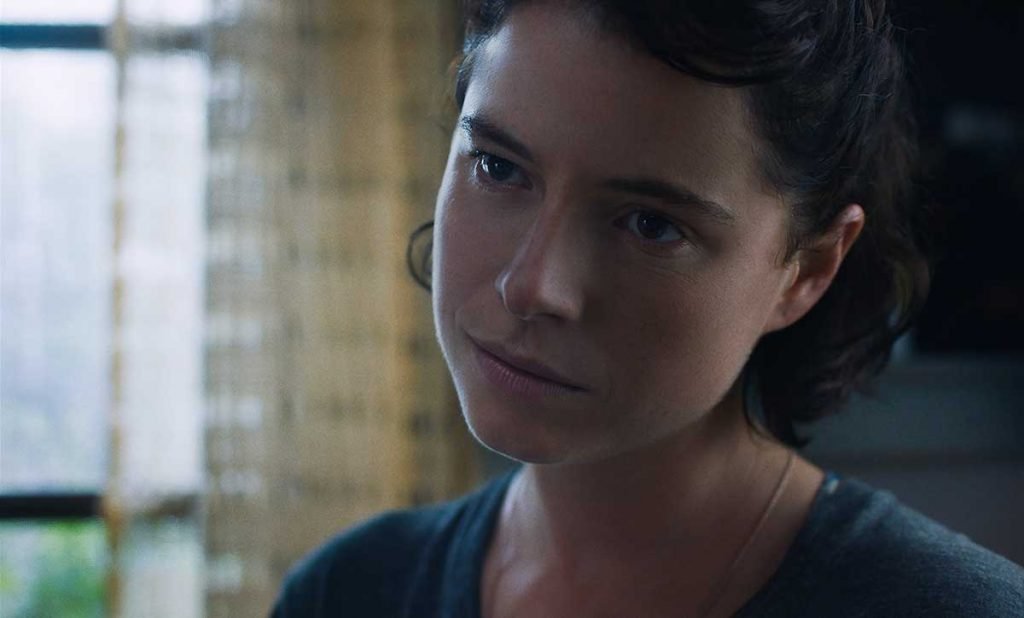The Lost Daughter is a mesmerizing meditation on the messiness of motherhood, led by a career-best Olivia Colman.
One of the darkest discoveries we make as we age is the realization that our parents are people and not the flawless mythological figures we’ve built them up to be throughout our childhood and adolescence. They don’t always “do” or “say” the right thing. They have wants and desires that may not align with their “expected” responsibilities as a caregiver. And, sometimes, some people just weren’t “programmed” to be parents – even if they become one anyway. Possessing the capability to have a child is one thing; committing to being a proper parent day in and day out is another. However, though both fathers and mothers experience these emotions from time-to-time – that nagging fear that this “wasn’t what they were meant for” – it’s mothers whose skepticism and sorrow is silenced and shamed, while fathers are often let off the hook for their fallibilities (a point Laura Dern so famously illustrates in her iconic Marriage Story monologue, describing how mothers will “always be held to a different, higher standard,” akin to the Mother Mary herself).
With her novel “The Lost Daughter”, Elena Ferrante confronted this contradiction head on – this idea that fathers were given the space to “fail” while mothers were not – daring to dive deep into the psyche of a mother who made mistakes that society would deem unforgivable and flesh out her feelings in a way that hopefully gave assurance to other women around the world that they were not alone to think these “unnatural” thoughts. And now, in her feature directorial debut, Maggie Gyllenhaal makes it her mission to spread that message further, adapting this tragic, tender, and tremendously thought-provoking tale for the silver screen and shining an even brighter spotlight on this subject matter. The film – and Ferrante’s novel – follows the enigmatic Leda (Olivia Colman, of The Favourite and The Father), a university professor taking a summer vacation on an island in Greece, where she soon finds her peace disturbed by a preoccupation with another vacationing woman named Nina (Dakota Johnson, of Fifty Shades of Grey and Suspiria) and her difficult relationship with her daughter, prompting memories of regrets Leda has from raising her own children.
What comes next is a riveting recontextualization of Leda’s past, as she looks back on choices she made that felt undeniably fulfilling in the moment yet have haunted her ever since, due to society’s objections towards mothers who are anything but entirely selfless. Gyllenhaal’s gloriously sinuous and sophisticated screenplay shifts between past and present, showing us the very events Leda is so embarrassed by today, as her younger self (passionately portrayed by Jessie Buckley, of Wild Rose and I’m Thinking of Ending Things) rejects her motherly responsibilities in pursuit of personal and professional interests, defying the unsaid social decrees that dictate how a “decent” mother behaves. In riveting fashion, Gyllenhaal also refrains from “giving away the game” too early, allowing us to sit with the adult Leda’s anxiety and hypothesize about what possibly could have caused the hurt she now holds in her heart. For what could’ve been such a straightforward story, Gyllenhaal sets The Lost Daughter apart by structuring it like a suspenseful mystery, forcing us to feel Leta’s restless agony right alongside her, centering her mental strife – caused by cultural castigation – over the specifities of her supposed “transgressions.”

As such, we’re also able to better understand Leda as an individual – and relate to her – before many may be alienated by her more “subversive” actions. And, miraculously, Gyllenhaal’s purposeful methods pay off in spades. There will undoubtedly be some who still struggle to embrace such an unconventional mother as Leda, but Gyllenhaal succeeds at showing the similarities Leda shares with stressed and strained parents everywhere, so that, when her more controversial characteristics are conveyed, audiences withhold their judgment.
After all, by that point, it’s abundantly clear that Leda is no monster – she’s a mother with the same transgressive thoughts every mother has had, and the only difference is that she decided to act on them. In any other writer’s hands, it’s easy to see how Leda could’ve been condemned or purely portrayed as problematic, but Gyllenhaal is too savvy a storyteller to shortchange her like that. While she certainly doesn’t shy away from Leda’s shortcomings – her impulsive inclinations, her occasionally turbulent temper – she balances out the “bad” with a depiction of her more accessible attributes and ambitious dreams that almost anyone can connect with. Does she not deserve a love that makes her feel like she’s been lifted off her feet or an education that enlightens her emotionally? Why should her status as a mother mean she must sacrifice pursuits of passion – pursuits that every human is pulled toward?
It’s a gift that Gyllenhaal had the towering acting talent of Olivia Colman at her disposal, as it’s hard to imagine many other actresses today capable of bringing such a complicated character to life with her intricacies intact while never alienating the audience. Simply put, Colman delivers a masterclass of the craft with this performance, one which very well may be her best to date. Oscillating between exhilarant euphoria (seen in a sequence in which Colman beautifully belts along to Bon Jovi), subtle suffering, and raucous rage, Leda is a powder keg of pain mere moments away from imploding, but Colman keeps composed as best she can, while still making us wonder if this is the moment where she finally falls apart, scene after scene. Truth be told, the entire ensemble is excellent, with Johnson impeccably inhabiting the nebulous Nina and Buckley in particular serving up a sensational supporting turn as she shoulders most of the darker decisions Leda makes in her youth with perceptive panache, but Colman reigns supreme, from the first frame to the last. Her forlorn face is one that you won’t soon forget – the expression of a woman made to feel evil for reaching a breaking point and putting herself first.
Gyllenhaal’s dark yet dreamy direction is as skillful as her screenwriting, with her consummate command behind the camera announcing her as a vital new voice in cinema. Her soul is suffused into every scene of this story, and her mission with the movie’s messaging is clear and coherent the whole way through, allowing the themes to transcend and take on a life of their own in the hearts and minds of audience members. And, when all is said and done, what we’re left with is one of the most audacious film adaptations of a novel in years, and a mesmerizing meditation on the messiness of motherhood – a story that is so rarely showcased on such a scale, if ever. It’s boundary breaking and winningly wrought work that aims to not just entertain but educate as well, and on both fronts, it flourishes fantastically. Aided by Olivia Colman at her career-best, Maggie Gyllenhaal has crafted a new classic with The Lost Daughter – and simultaneously shown the industry that she’s a creative who can cut to the core of a cultural conversation and tell the truth.

